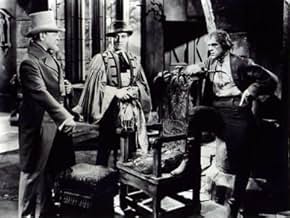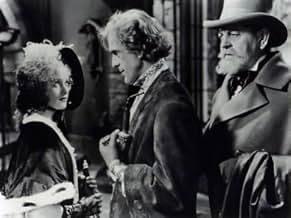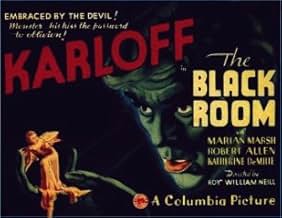Añade un argumento en tu idiomaIgnoring an ancient prophecy, evil brother Gregor seeks to maintain his feudal power on his his Tyrolean estate by murdering and impersonating his benevolent younger twin.Ignoring an ancient prophecy, evil brother Gregor seeks to maintain his feudal power on his his Tyrolean estate by murdering and impersonating his benevolent younger twin.Ignoring an ancient prophecy, evil brother Gregor seeks to maintain his feudal power on his his Tyrolean estate by murdering and impersonating his benevolent younger twin.
- Dirección
- Guión
- Reparto principal
- Mashka
- (as Katherine de Mille)
- Court Clerk
- (sin acreditar)
- Anton as a Child
- (sin acreditar)
- Franz - Captured Assassin-Villager
- (sin acreditar)
- Gregor's Hairdresser
- (sin acreditar)
- Karl - Lead Villager
- (sin acreditar)
- Member of the Court
- (sin acreditar)
- Member of the Court
- (sin acreditar)
- Michael the Footman
- (sin acreditar)
- Gatekeeper
- (sin acreditar)
Reseñas destacadas
An interesting star vehicle for Boris Karloff allowing him to play two roles as contrasting twins; the fact that one of them is deformed may owe something to Lon Chaney and here Karloff demonstrates himself a most worthy successor to the Master's mantle. The period setting - its-folk-tale quality hearkens back to German Expressionism - serves the handsome production extremely well, especially when considering that Columbia Pictures at the time was just starting to pose a serious challenge (following the Oscar sweep of Frank Capra's IT HAPPENED ONE NIGHT [1934]) to the major studios. Director Roy William Neill handles the proceedings with great efficiency and style providing plenty of visual flourishes along the way.
The only criticism one can level at the film regards a couple of slightly contrived plot points: the evil Karloff, who has done away with his benign but paralyzed sibling and whom he impersonates in order to win the girl he loves, is rather stupidly caught by the girl's father when he is spotted in a mirror using his 'lame' hand to sign the marriage contract; Karloff's come-uppance is brought about by his dead brother's faithful mastiff which hates his guts - it's implausible to think that the dog has kept away from Karloff for days (by which time the girl's lover has been convicted for her father's murder) only to conveniently reappear on his wedding day! However, the ironic climax - which allows the prophecy tied with Karloff's family name to be fulfilled - is a splendid one.
All in all, along with THE MASK OF FU MANCHU (1932) and THE WALKING DEAD (1936; see below), THE BLACK ROOM is Karloff's best vehicle of the 1930s which wasn't produced by the studio which made his name, Universal.
Incidentally, is it just me, or does the loud brass fanfare that occurs in the title sequence, and throughout the film at dramatic moments, sound like part of the song "Come Rain or Come Shine" ("days may be cloudy or sunny...")? I just found it a bit distracting to suddenly picture Judy Garland in my mind at all the most tense and dramatic moments of the story.
A special note must be payed to the lovely Marian Marsh. Marsh rounds out the cast and does a fantastic job alongside the dominant men of the cast (not just Karloff, but practically everyone). Her beauty and charm sell the picture well, as the Baron's love for her character really drives the plot. Sadly, Marsh gave up acting in 1959 to become an environmentalist. While I fully sympathize with the move, Hollywood was denied a great talent and spirit for the next forty years (the time of Marsh's death).
I strongly encourage those who enjoy older films to give this one a try. I found it both enjoyable and critically satisfying. So many thrillers of the 1930s seem one-dimensional and cliché, but "The Black Room" is fresh, prescient and timeless. I would love to see a deluxe edition of this film, though I suppose it is now too late. Its due failed to come when it mattered most.
¿Sabías que...?
- CuriosidadesPresent existent version, as presented on Turner Classic Movies, bears title and end credits redesigned for the 1955 wide screen re-release.
- PifiasThe film is set in the early 1800s, yet a statue of St. Therese of Lisieux (Therese Martin) is prominently displayed in the castle three times (at around 17 mins, 40 mins, and 47 mins). Therese Martin was not born until 1873. Furthermore, no statue of St. Therese was made or displayed until after she was canonized, in 1925.
- Citas
Mashka: Don't you want to kiss me?
Baron Gregor de Bergmann: [Cutting a juicy pear with his knife and eating it as he talks] A pear is the best fruit!
Mashka: Every time you see her, you want to be rid of me.
Baron Gregor de Bergmann: [Seemingly ignoring her] Lots of juice in a pear!
Mashka: Well, you'll find out I'll not be got rid of so easily! Do you hear what I say?
Baron Gregor de Bergmann: Adam should've chosen a pear.
Mashka: You've got it all planned, haven't you? You're gonna marry her. You're gonna make her your wife, your baroness!
Baron Gregor de Bergmann: I like the feel of a pear! And when you're through with it...
[He carelessly tosses it across the room]
- ConexionesFeatured in Monday Night Fright: The Black Room (1962)
Selecciones populares
- How long is The Black Room?Con tecnología de Alexa
Detalles
- Fecha de lanzamiento
- País de origen
- Idioma
- Títulos en diferentes países
- The Black Room
- Localizaciones del rodaje
- Culver City, California, Estados Unidos(Exterior Castle set and Exterior Tyrolean town at the RKO Forty Acres Backlot)
- Empresa productora
- Ver más compañías en los créditos en IMDbPro
- Duración1 hora 8 minutos
- Color
- Relación de aspecto
- 1.37 : 1
Contribuir a esta página




































